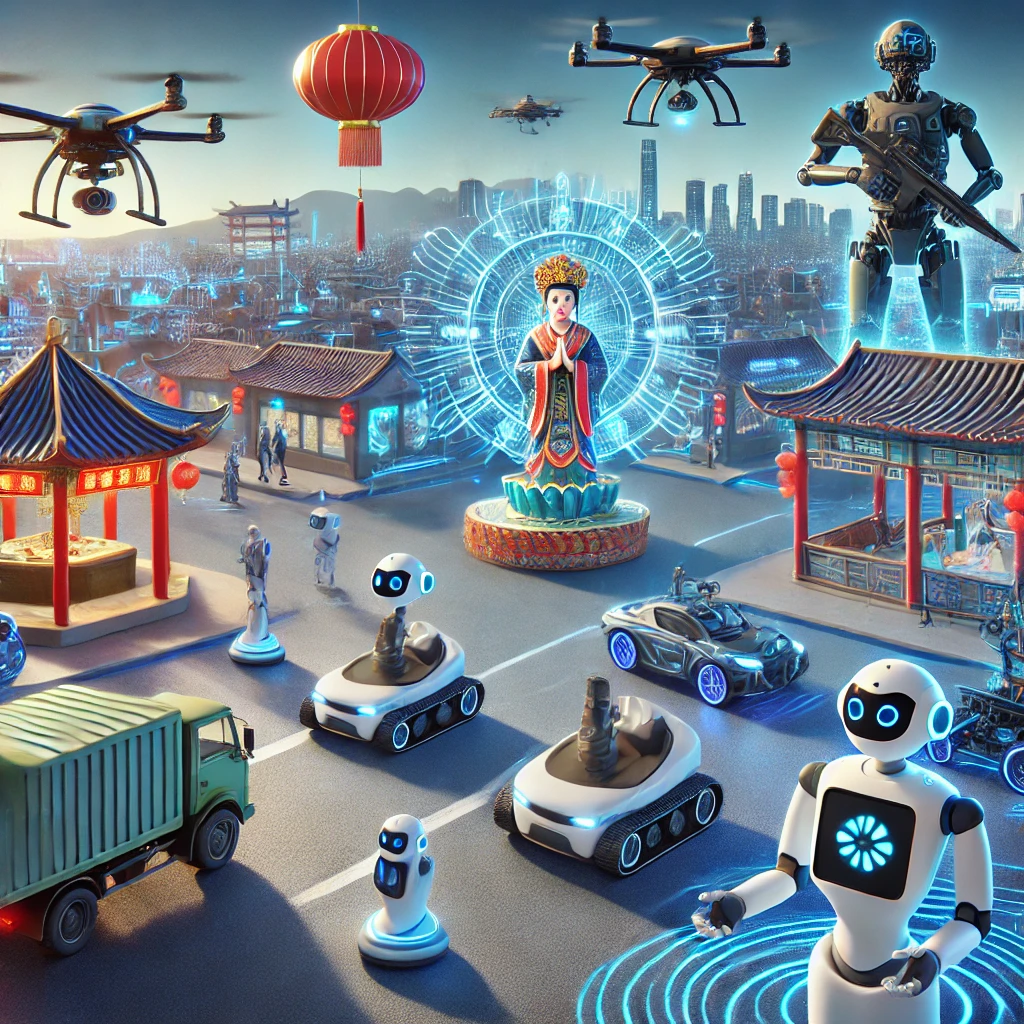Introduction
Artificial Intelligence (AI) is rapidly transforming various aspects of society, from entertainment and festivals to national defense. In China, AI-powered bots played a significant role during the Spring Festival, enhancing celebrations through automation, virtual assistants, and smart robotics. At the same time, AI’s growing capabilities have caught the attention of military strategists, with advancements being explored for defense applications, autonomous systems, and battlefield intelligence.
This article delves into how AI-enhanced bots were used in China’s Spring Festival, their technological advancements, and how similar AI-driven innovations are shaping military strategies for the future.
AI-Powered Bots in China’s Spring Festival
1. Enhancing Cultural and Social Experiences
The Chinese New Year, or Spring Festival, is a time of grand celebrations involving travel, entertainment, and social gatherings. AI-powered bots played a key role in:
- Virtual Hosts and Digital Avatars: AI-driven hosts were featured in televised Spring Festival Galas, offering real-time interactions and dynamic performances.
- Chatbots for Festival Assistance: AI chatbots provided travel updates, event schedules, and personalized recommendations to festival-goers.
- AI-Powered Performances: Holographic shows and synchronized AI-powered robots entertained audiences in large public celebrations.
2. AI in Festival Logistics and Transportation
China experiences the largest annual human migration during the Spring Festival. AI was leveraged to optimize transportation and logistics:
- AI-Powered Traffic Management: Smart surveillance and AI-driven predictive analytics helped reduce congestion at major transportation hubs.
- Autonomous Delivery Bots: AI-driven delivery robots ensured swift and contactless food and gift deliveries during the festival rush.
- Facial Recognition at Train Stations: AI-based facial recognition expedited security checks and ticket verification, reducing wait times.
3. Smart Retail and E-Commerce Innovations
The demand for festive shopping saw an increase in AI-assisted retail experiences:
- AI-Powered Shopping Assistants: Virtual assistants recommended personalized gifts based on user preferences.
- Smart Warehouses: AI-controlled logistics centers automated order fulfillment and inventory management.
- Robot-Operated Stores: Several cities tested unmanned convenience stores, allowing customers to shop via AI-assisted checkouts.
AI’s Role in China’s Military Advancements
1. Autonomous Military Bots and Drones
China has been integrating AI into its military programs to enhance automation and combat effectiveness:
- AI-Driven Combat Drones: China’s military has developed autonomous UAVs (Unmanned Aerial Vehicles) capable of conducting surveillance, reconnaissance, and targeted strikes.
- Robot Soldiers: AI-assisted robots are being designed for hazardous combat scenarios, reducing human casualties.
- AI-Enabled Submarines: China is exploring autonomous underwater drones for maritime security and surveillance.
2. AI in Cybersecurity and Warfare
AI is increasingly being used to strengthen national security and cyber defense capabilities:
- AI-Powered Threat Detection: China employs AI-driven cybersecurity systems to identify and neutralize cyber threats in real-time.
- Automated Warfare Tactics: AI algorithms assist in strategic military planning by analyzing enemy movements and predicting attack patterns.
- Deepfake Intelligence Operations: AI-generated deepfakes are being used for psychological warfare, misinformation campaigns, and intelligence gathering.
3. AI in Decision-Making and Command Centers
AI is revolutionizing military command structures by aiding in faster, data-driven decisions:
- Battlefield Analytics: AI systems process real-time combat data to provide tactical recommendations to military leaders.
- Predictive Maintenance for Military Equipment: AI identifies potential failures in aircraft, tanks, and naval fleets, preventing unexpected breakdowns.
- AI-Powered Satellite Surveillance: China utilizes AI-driven satellites for enhanced geospatial intelligence and strategic monitoring.
Ethical and Strategic Implications of AI in Warfare
1. Ethical Challenges
- Autonomous Weapons Risks: The development of AI-driven combat drones and robots raises concerns about uncontrolled warfare and accountability.
- Human vs. Machine Decision-Making: AI-powered military systems lack human judgment and moral reasoning, leading to ethical dilemmas.
- Surveillance Concerns: AI-driven facial recognition in defense may lead to mass surveillance and privacy violations.
2. Global AI Arms Race
China’s advancements in military AI are sparking a global race for AI dominance in warfare:
- U.S. vs. China AI Military Programs: The U.S. is developing autonomous fighter jets and AI-assisted missile systems, fueling competition.
- AI Regulations in Warfare: International efforts are being made to establish ethical guidelines for AI weaponization.
- Geopolitical AI Strategies: Countries are forming AI alliances to counteract potential threats from rival nations.
The Future of AI Bots: From Festivals to the Battlefield
1. AI’s Dual Use in Civilian and Military Sectors
AI technologies developed for civilian applications (such as festival logistics and virtual assistants) are being adapted for military operations.
- Autonomous delivery bots → Military supply drones.
- AI traffic control systems → Military convoy coordination.
- Facial recognition for event security → Biometric identification in defense intelligence.
2. AI Innovations Shaping Future Military Strategies
Looking ahead, China aims to integrate AI into:
- AI-Powered War Games: Simulating battle strategies for real-time decision-making.
- Super Soldiers with AI Augmentations: AI-powered exoskeletons to enhance soldier endurance.
- Swarm Robotics: Large-scale coordinated drone attacks controlled by AI.
Conclusion
The use of AI-powered bots in China’s Spring Festival demonstrates how advanced automation can enhance cultural celebrations, optimize logistics, and improve consumer experiences. However, the same AI-driven technologies are being repurposed for military advancements, shaping the future of warfare, defense intelligence, and autonomous combat systems.
As AI continues to evolve, the line between civilian and military applications will become increasingly blurred. Balancing innovation with ethical considerations will be crucial in shaping the future of AI in both societal and defense sectors.
Also Read:
China’s Spring Festival Celebration Featured a Fleet of Dancing Robots That Flexed the Country’s Advancements in Robotics
Ukraine, Taiwan Face-Offs Help Drive Drone, AI Revolution









+ There are no comments
Add yours